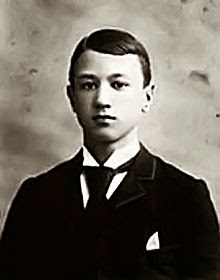 |
| Charles Ives, 1889 |
Charles Ives took to the organ and became so proficient on the instrument that he was a professional church organist when he was fourteen, the youngest one in the entire state at the time. Ives attended Yale University and upon his graduation he was hired as an insurance actuary by a firm in New York. He made the insurance business his life's work. He excelled in the insurance business and composed in his spare time. Most of his music was neglected in his lifetime, especially in the years he was active as a composer. Ives ceased composing any new works after 1927, although he did revise some that were already written. His music began to get some performances in the 1940's and after a performance of Symphony No. 3, The Camp Meeting, Ives was awarded the Pulitzer Prize in music. He was also very active in financially supporting other 20th century composers and their music.
Ives' music won the support of a young Leonard Bernstein who conducted Ives' Second Symphony on a live radio broadcast in 1951. Arnold Schoenberg, the great composer and teacher knew of Ives and after Schoenberg died in 1951 (three years before Ives), Schoenberg's widow found a note written by her husband in his desk that had been written in 1944:
There is a great Man living in this Country – a composer. He has solved the problem how to preserve one's self-esteem and to learn. He responds to negligence by contempt. He is not forced to accept praise or blame. His name is Ives.One of his earliest pieces was Variations On 'America', written for organ in 1891 when Ives was 17 years old. It was written for a Fourth Of July celebration and the music shows how much his father had influenced the young man. The tune is also known as 'God Save The King' in Great Britain.
Introduction and theme- The work begins with an introduction to the tune that fragmentarily suggests parts of the tune itself. The tune is finally heard in a straight forward arrangement for the organ.
1st Variation - The tune is repeated over a running sixteenth note accompaniment in the first section, and an even more florid accompaniment of 32nd notes in the second section.
2nd. Variation - The pace changes slightly, along with the rhythm of the tune. At the end of the first section there is a descending figure of chromatic chords that gives the impression of a chuckle. The second section has subtle harmonic changes.
Interlude - A fragmentary rendition of the tune that Ives evidently didn't find worthy enough to call a variation, this interlude has one hand playing in the key of F major (the home key of the piece thus far) while the other hand and pedals play in D-flat major, an early example of bitonality.
3rd Variation - Ives gives a sprightly rendition of the tune, like music perhaps heard on a merry-go-round, all in the key of D-flat major.
4th Variation - Ives shifts gears and throws this variation in the key of F minor. He labels this variation a Polonaise, but it sounds like spirited Spanish dance to me.
Interlude - This time Ives has one hand play in A-flat major while the other hand and pedals play in F major.
5th Variation - Marked Allegro - as fast as the pedals can go, the pedals have the main variant. The tune continues in elaborate dress that shows how good Ives' organ technique must have been. The variation leads to a coda that has fragments of the theme tossed off in full volume, along with pauses for good measure. The music gets more hectic until a full throated repeat of the tune ends the work.
